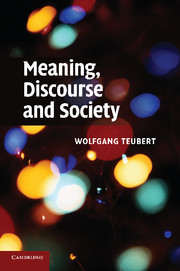Book contents
- Frontmatter
- Contents
- Acknowledgements
- Introduction
- Part I Meaning, the mind and the brain
- 1 The cognitive turn
- 2 The long history of mind linguistics
- 3 What do we know about mental concepts?
- 4 Morphing theoretical sémes into ‘real’ concepts
- 5 From mental representations to conceptual ontologies
- 6 What is meaning?
- 7 Where should we look for meaning?
- Part II Discourse and society
- Conclusion
- Bibliography
- Index
3 - What do we know about mental concepts?
Published online by Cambridge University Press: 04 August 2010
- Frontmatter
- Contents
- Acknowledgements
- Introduction
- Part I Meaning, the mind and the brain
- 1 The cognitive turn
- 2 The long history of mind linguistics
- 3 What do we know about mental concepts?
- 4 Morphing theoretical sémes into ‘real’ concepts
- 5 From mental representations to conceptual ontologies
- 6 What is meaning?
- 7 Where should we look for meaning?
- Part II Discourse and society
- Conclusion
- Bibliography
- Index
Summary
In 1975, Jerry Fodor, a linguist/philosopher close to Noam Chomsky, published his highly influential book The Language of Thought. Here we find the ancient and medieval idea of a lingua mentis in a new wrapping, incidentally without any reference to earlier sources. Indeed it seems almost to have been a complete reinvention. In this book, Fodor pursues the idea that even very young children, before they acquire the natural language spoken in their environment, already possess a language, namely this language of thought, now sometimes also called mentalese. There must be a language of thought, he argues, because ‘you cannot learn a language whose terms express semantic properties not expressed by the terms of some language you are already able to use’ (Fodor 1975: 61). As this is true and accepted for learning a second language, it must also hold for the first (external) language. People are born with an innate language, a mentalese which is universal, i.e. the same for everyone regardless of their ethnic origin. When we speak, we actually formulate an utterance in the language of thought which we subsequently translate into the language we have acquired, in order to communicate: ‘English has no semantics. Learning English isn't learning a theory about what its sentences mean. It's learning to associate its sentences with the corresponding thoughts’ (Fodor 1998: 9, Fodor's emphasis). for Fodor, natural language words are secondary, and mental concepts are primary.
- Type
- Chapter
- Information
- Meaning, Discourse and Society , pp. 53 - 62Publisher: Cambridge University PressPrint publication year: 2010

